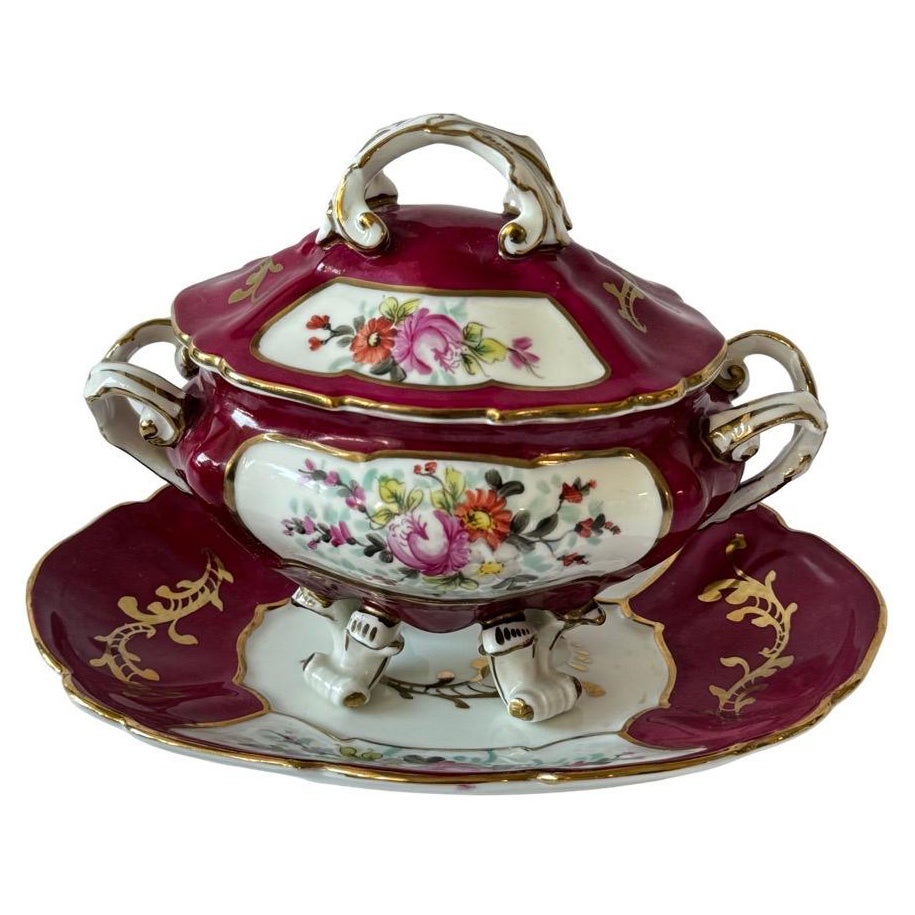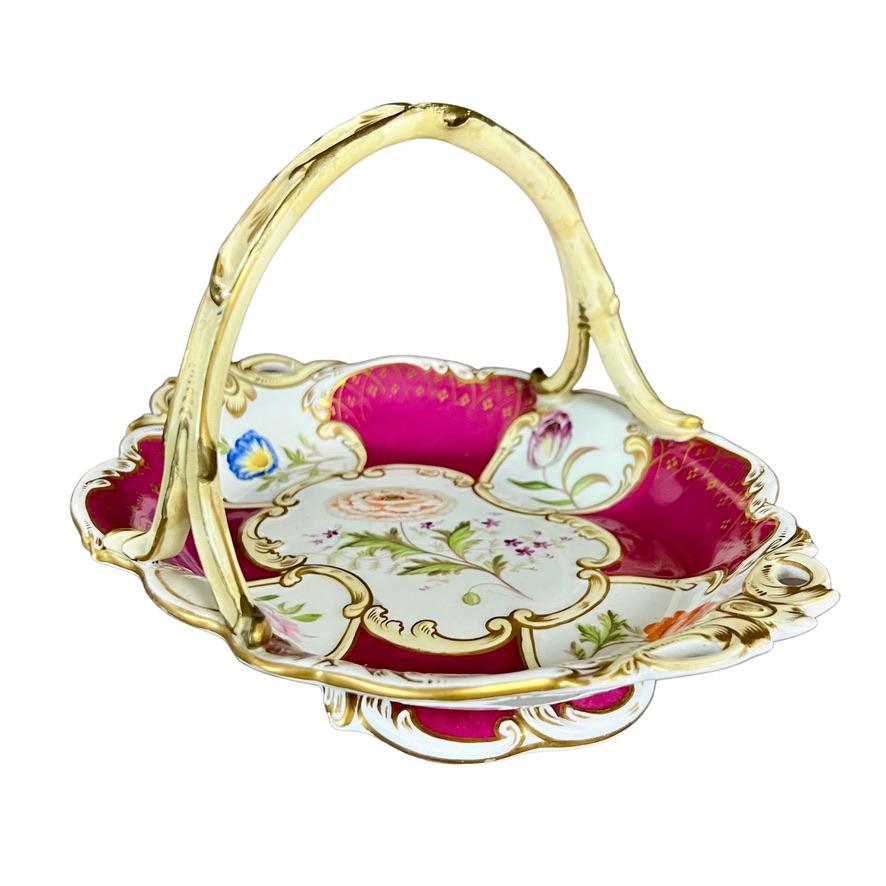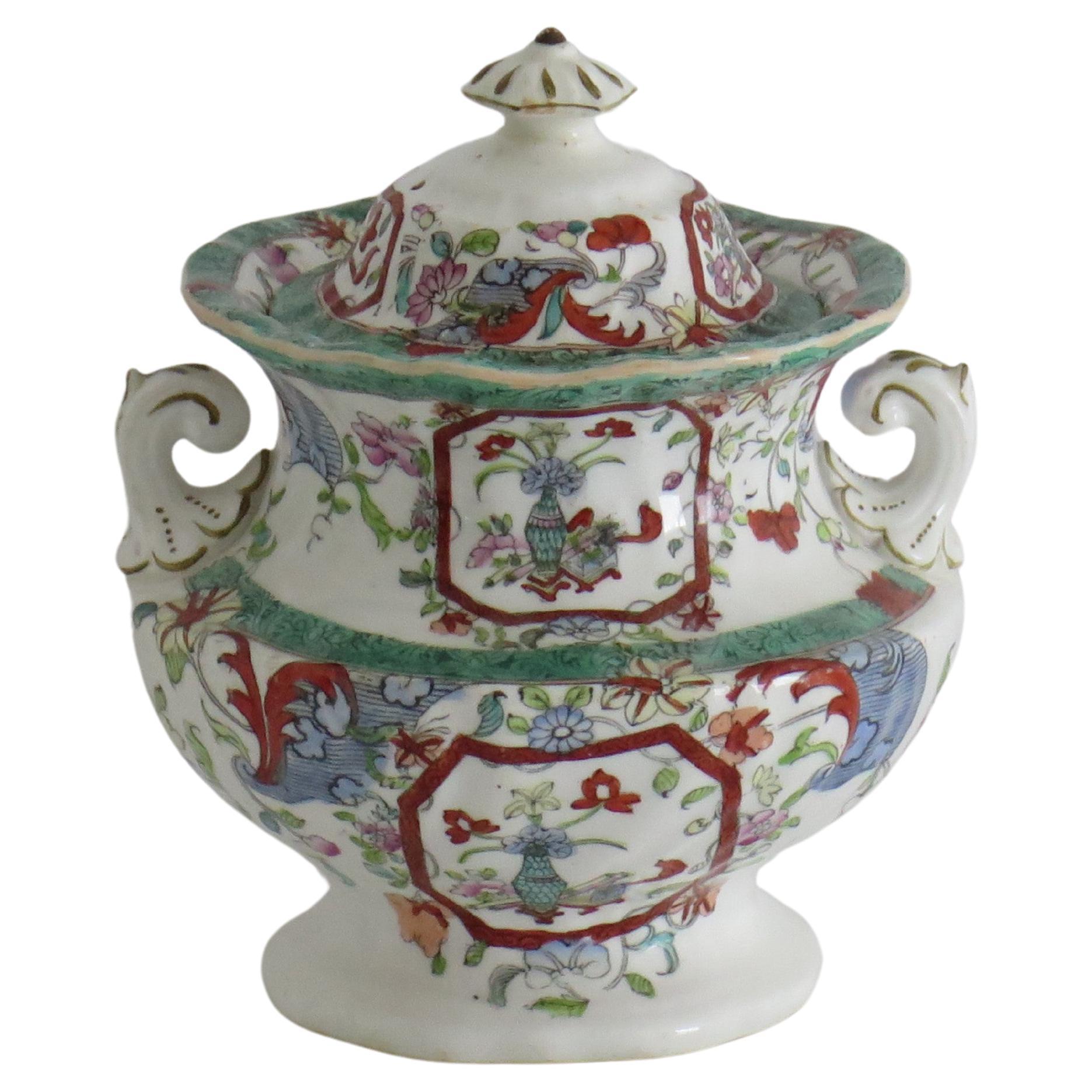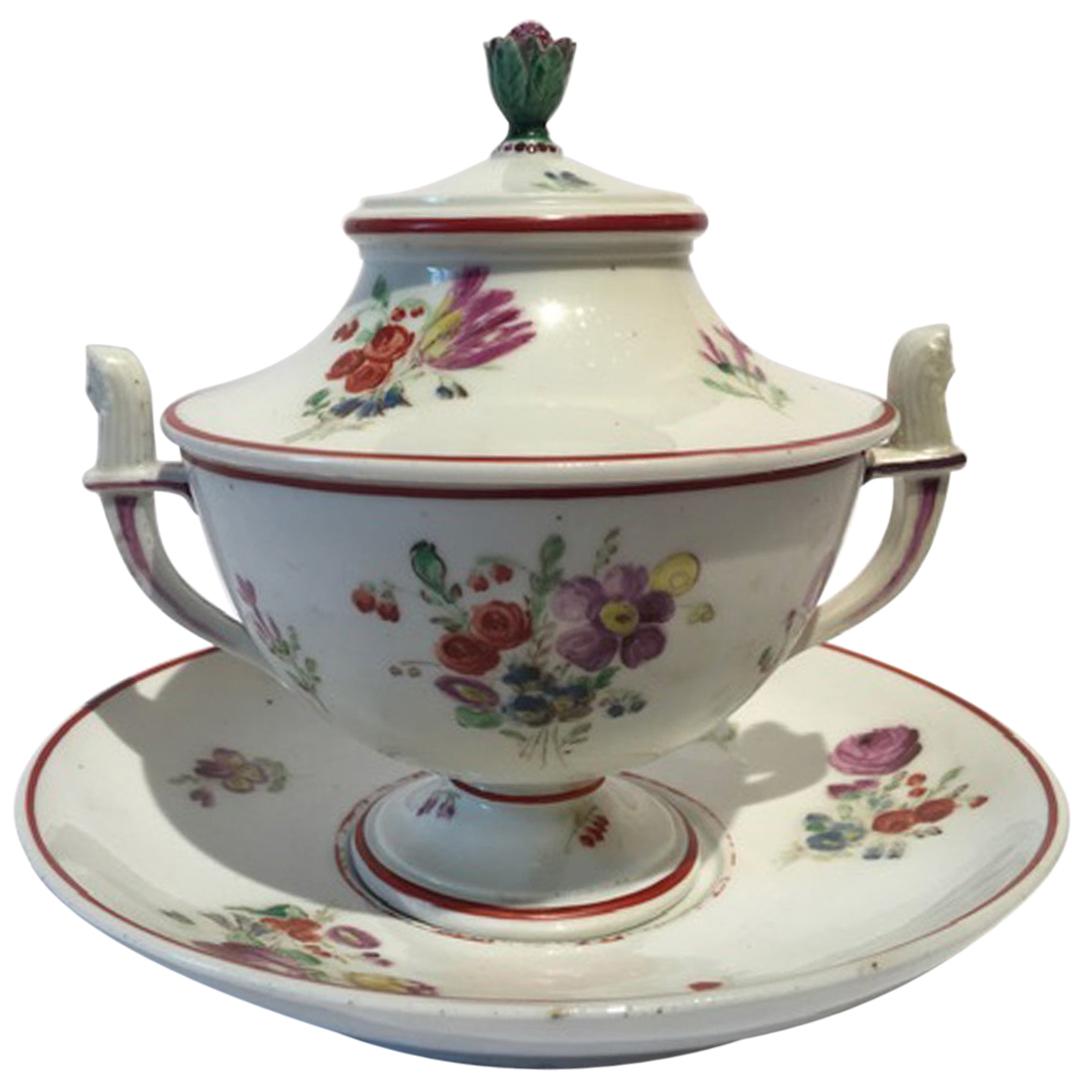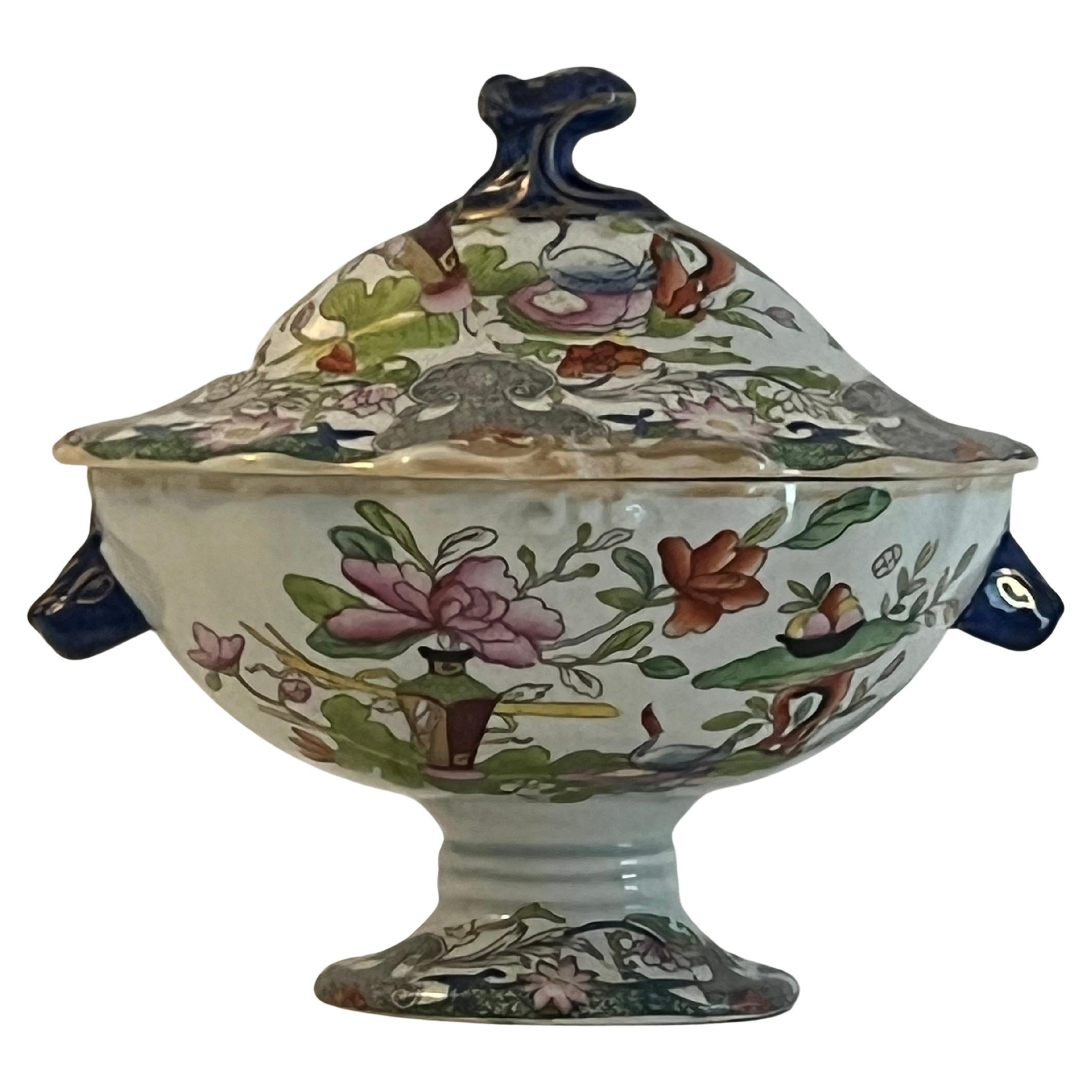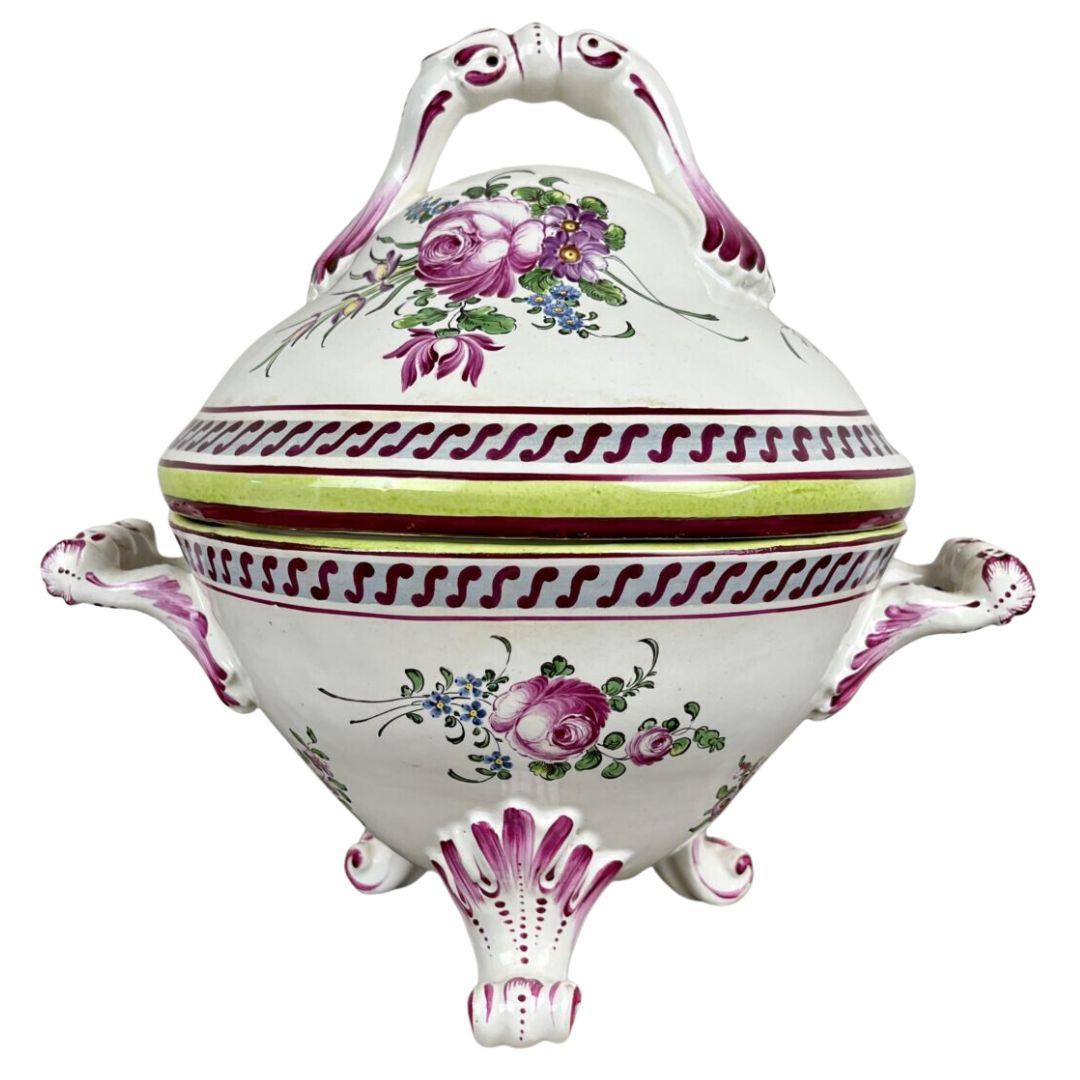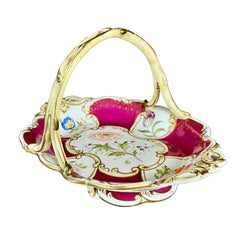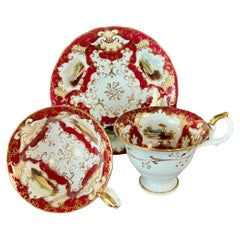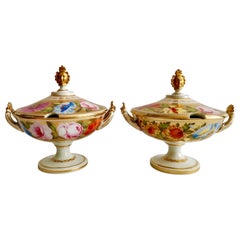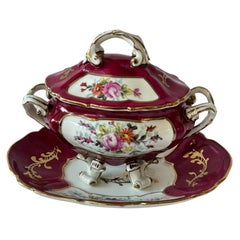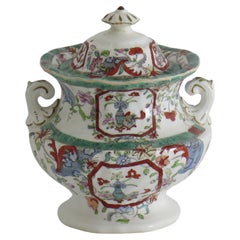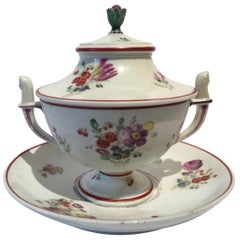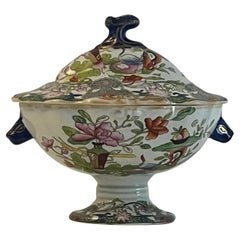Items Similar to Samuel Alcock Footed Porcelain Sauce Tureen, Maroon with Flower Sprays, ca 1842
Want more images or videos?
Request additional images or videos from the seller
1 of 17
Samuel Alcock Footed Porcelain Sauce Tureen, Maroon with Flower Sprays, ca 1842
$600per set
$750per set20% Off
£455.59per set
£569.49per set20% Off
€521.01per set
€651.26per set20% Off
CA$838.29per set
CA$1,047.86per set20% Off
A$932.36per set
A$1,165.45per set20% Off
CHF 486.85per set
CHF 608.56per set20% Off
MX$11,345.81per set
MX$14,182.26per set20% Off
NOK 6,217.80per set
NOK 7,772.25per set20% Off
SEK 5,831.20per set
SEK 7,289per set20% Off
DKK 3,888.47per set
DKK 4,860.58per set20% Off
Shipping
Retrieving quote...The 1stDibs Promise:
Authenticity Guarantee,
Money-Back Guarantee,
24-Hour Cancellation
About the Item
A footed two-handled sauce tureen with cover, maroon and pale yellow ground with beautiful hand painted flower sprays on lower part of body; twisted handles and a petticoat stem
Pattern 2/817
Year: ca 1842
Size: 20cm tall incl. finial (8.5”)
Condition: very faint stress cracks on inside, these don’t go through the body
The Samuel Alcock factory was operative in Staffordshire between 1822 and 1856, after which it was bought by Sir James Duke and Nephews. The factory started as a partnership between the young Samuel Alcock and the older Ralph Stevenson, who provided the factory and capital. Alcock quickly took the factory to great heights, building one of the biggest factories of its time. Alcock jumped on the new Rococo Revival fashion and served a huge new middle class market. The reason we now don't hear much about Samuel Alcock porcelain is that much of it has been mis-identified over the years and attributed to Coalport, Ridgway, Rockingham or others; Alcock did not mark any of his porcelain save a few rare pieces, and the numbering system is difficult to understand. However, the wares are still wide spread and many are of great quality.
This sauce tureen forms part of the Murray Pollinger Collection of Samuel Alcock Porcelain.
Murray Pollinger was a passionate collector of Samuel Alcock porcelain. He was known as a true gentleman, impeccably dressed, always kind and modest - even some of his porcelain collecting friends had no idea about the size and importance of his collection. From the mid 1980s until shortly before his death in 2022 he collected many thousands of pieces and painstakingly catalogued them. He also went on trips to Staffordshire to discover the history of Samuel Alcock from whatever little documentation has been preserved. Through his painstaking work, Pollinger was able to make sense of the pattern numbering system that was used, and this was a huge step forward in identifying and understanding the porcelain. A website with the results of his research will be made available over the course of 2023. While he sold off about half of his collection in 2016, the remaining half is now made available to a new generation of collectors.
Antique British porcelain is never perfect. Kilns were fired on coal in the 1800s, and this meant that china from that period can have some firing specks from flying particles. British makers were also known for their experimentation, and sometimes this resulted in technically imperfect results. Due to the shrinkage in the kiln, items can have small firing lines or develop crazing over time, which should not be seen as damage but as an imperfection of the maker's recipes, probably unknown at the time of making. Items have often been used for many years and can have normal signs of wear, and gilt can have signs of slight disintegration even if never handled. I will reflect any damage, repairs, obvious stress marks, crazing or heavy wear in the item description but some minor scratches, nicks, stains and gilt disintegration can be normal for vintage items and need to be taken into account.
There is widespread confusion on the internet about the difference between chips and nicks, or hairlines and cracks. I will reflect any damage as truthfully as I can, i.e. a nick is a tiny bit of damage smaller than 1mm and a chip is something you can easily see with the eye; a glazing line is a break in the glazing only; hairline is extremely tight and/or superficial and not picked up by the finger; and a crack is obvious both to the eye and the finger. Etcetera - I try to be as accurate as I can and please feel free to ask questions or request more detailed pictures!
- Creator:Samuel Alcock & Co. (Maker)
- Dimensions:Height: 1 in (2.54 cm)Width: 1 in (2.54 cm)Depth: 1 in (2.54 cm)
- Sold As:Set of 2
- Style:Rococo Revival (Of the Period)
- Materials and Techniques:
- Place of Origin:
- Period:
- Date of Manufacture:circa 1842
- Condition:Wear consistent with age and use. very faint stress cracks on inside, these don’t go through the body.
- Seller Location:London, GB
- Reference Number:Seller: MP-ALC401stDibs: LU4805137165352
About the Seller
5.0
Gold Seller
Premium sellers maintaining a 4.3+ rating and 24-hour response times
Established in 2016
1stDibs seller since 2019
226 sales on 1stDibs
- ShippingRetrieving quote...Shipping from: London, United Kingdom
- Return Policy
Authenticity Guarantee
In the unlikely event there’s an issue with an item’s authenticity, contact us within 1 year for a full refund. DetailsMoney-Back Guarantee
If your item is not as described, is damaged in transit, or does not arrive, contact us within 7 days for a full refund. Details24-Hour Cancellation
You have a 24-hour grace period in which to reconsider your purchase, with no questions asked.Vetted Professional Sellers
Our world-class sellers must adhere to strict standards for service and quality, maintaining the integrity of our listings.Price-Match Guarantee
If you find that a seller listed the same item for a lower price elsewhere, we’ll match it.Trusted Global Delivery
Our best-in-class carrier network provides specialized shipping options worldwide, including custom delivery.More From This Seller
View AllSamuel Alcock Porcelain Basket, Rococo Revival, Maroon, Flower Reserves, ca 1835
By Samuel Alcock & Co.
Located in London, GB
A maroon ground basket in Rococo Revival style with pierced pale yellow ends, a twig handle and five flower reserves with single flowers.
Pattern 2/5610
Year: ca 1835
Size: 22.5cm (8.75”) long, 13cm (5”) tall
Condition: handle has been repaired, see last picture; some rubbing
This basket forms part of the Murray Pollinger Collection of Samuel Alcock Porcelain...
Category
Antique 1830s English Rococo Revival Decorative Baskets
Materials
Porcelain
$460 Sale Price
20% Off
Free Shipping
Worcester Chestnut Basket, Cover and Stand, Polychrome Flowers, 1770-1775
By 1st Period Worcester Dr. Wall
Located in London, GB
This is a very rare offer of a spectacular moulded and pierced chestnut basket, cover and stand, made by Worcester between 1770 and 1775 in their 1st or "Dr Wall" period. The set con...
Category
Antique 1770s English Rococo Porcelain
Materials
Porcelain
$2,200 Sale Price / set
20% Off
Samuel Alcock Tearcup Trio, Maroon, Yellow, Gilt and Fine Landscapes, ca 1845
By Samuel Alcock & Co.
Located in London, GB
A true trio consisting of a teacup, a coffee cup and a saucer, “rustic bean” shape, in deep maroon and pale yellow ground, with gilt and finely painted landscape reserves
Pattern 95...
Category
Antique 1840s English Rococo Revival Tea Sets
Materials
Porcelain
$348 Sale Price / set
20% Off
Free Shipping
Coalport Pair of Floral Gilded Sauce Tureens, Marquess of Anglesey, circa 1820
By Coalport Porcelain
Located in London, GB
This is an extremely rare set of lidded sauce tureens made by Coalport in circa 1820. The tureens are decorated in the "Marquess of Anglesey" pattern. These sauce tureens would have formed part of a large dessert service. They were used for the sauce to be served on ice cream or a cooked sweet dish, and the lids have holes for the sauce ladles.
Coalport was one of the leading potters in 19th and 20th century, coming out with many innovative designs. The pottery emerged around the year 1800 in Shropshire, right on the edge of Staffordshire and near other great makers such as Spode, Minton, Davenport and many others. They went on to become a major potter in the 19th century and brought out many iconic designs.
The Welsh Nantgarw factory first created the heavily gilded service for the Marquess of Anglesey, with beautifully painted flowers. Later the Swansea factory made additions to or copies of this service, and circa 1820 Coalport...
Category
Antique 1820s English Regency Porcelain
Materials
Porcelain
$3,950 / set
Free Shipping
Chelsea-Derby Chocolate Cup Set, Gilt Stripes, Puce Flowers, Rococo 1770-1775
By Chelsea Porcelain, Chelsea-Derby, Derby
Located in London, GB
This is a beautiful chocolate cup set made by Chelsea-Derby between 1770 and 1775, which was the Rococo era. The set consists of a cup, a saucer and a cover, and is decorated in a st...
Category
Antique 1770s English Rococo Tea Sets
Materials
Porcelain
$940 Sale Price / set
23% Off
Free Shipping
Samuel Alcock Porcelain Teapot, Blue, Gilt and Flowers, Rococo Revival ca 1837
By Samuel Alcock & Co.
Located in London, GB
A teapot with cover in the “rustic bean” shape, cobalt blue ground with gilt acanthus motif and finely painted flower posies on the belly of the teapot
Pattern 5782
Year: ca 1837
Si...
Category
Antique 1830s English Rococo Revival Tea Sets
Materials
Porcelain
$600 Sale Price
20% Off
Free Shipping
You May Also Like
French Sèvres-Style Hand-Painted Porcelain Tureen with Stand, ca. 1930s
Located in CANNES, FR
Elegant French porcelain tureen on stand, richly hand-painted in the Sèvres style with vivid floral panels, deep burgundy ground, and delicate gilded accents. Featuring ornate scroll...
Category
Early 20th Century French Rococo Serving Bowls
Materials
Porcelain
William IVth Mason’s Porcelain Desert Tureen or Sucrier Pattern 223, circa 1830
By C.J. Mason 1
Located in Lincoln, Lincolnshire
This is an early English porcelain Sauce Tureen or Sucrier, made by C. J. Mason (The same factory who produced Mason's Ironstone) during the period of William IVth, circa 1830-1835.
...
Category
Antique Early 19th Century English William IV Ceramics
Materials
Porcelain
Italy 18th Century Richard Ginori Porcelain Sugar Bowl with Cover
By Richard Ginori
Located in Brescia, IT
This fine and elegant sugar bowl in neoclassical style is a piece handmade by the well known Italian factory Richard Ginori in Doccia. The set is composed by three pieces: the sugar ...
Category
Antique Mid-18th Century Italian Baroque Porcelain
Materials
Porcelain
$1,294 Sale Price
28% Off
Masons Ironstone Sauce Tureen & Cover Table & Flower Pot Ptn, Georgian Ca 1818
By Mason's Ironstone
Located in Lincoln, Lincolnshire
This is a beautiful Ironstone Sauce Tureen, complete with lid, made by Mason's of Lane Delph, Staffordshire, England, during the early part of the 19th century, circa 1820.
This t...
Category
Antique Early 19th Century English Chinoiserie Serving Pieces
Materials
Ironstone
Large 19th Century Rococo French Faience Soup Tureen
Located in Fort Lauderdale, FL
A large cauldron-shaped French faience tureen raised on scrolling tri-form feet, with twin handles and domed lid decorated with hand-painted sprays of roses and borders of vitruvian ...
Category
Antique Late 19th Century French French Provincial Soup Tureens
Materials
Faience
Georgian Masons Ironstone Sauce Tureen & Lid Gilded Water Lily Pattern, Ca 1820
By Mason's Ironstone
Located in Lincoln, Lincolnshire
This is a superb Ironstone Sauce Tureen, complete with lid , made by Mason's of Lane Delph, Staffordshire, England, during the early part of the 19th century, circa 1820.
This tureen is well potted and is hexagonal in shape with moulded animal head handles to the base and a flower head knob to the lid.
The pattern is called "Water Lily" and is a well known Mason's pattern, as illustrated on pages 136 in The Mason's collectors Club book " A Guide to Mason's patent Ironstone patterns, c 1813 to c 1848" . This particular piece is the gilded version of the pattern and has heavily applied hand gilded highlights. Tureens of the same shape and period are illustrated on Pages 145 and 155 of Godden's Guide to Mason's China and the Ironstone Wares published by the Antique Collectors' Club.
The pattern is beautifully hand painted over a printed pattern with bold enamels of Cobalt Blue, burnt orange, green, puce all in various shades with much additional hand gilding.
The pieces are unmarked as was often the case if the item had formed part of a large dinner or desert service...
Category
Antique Early 19th Century English Chinoiserie Ceramics
Materials
Ironstone
More Ways To Browse
Glass Flower Stem
Kiln Formed Glass
Stained Glass Dress
Small Tureen
Staffordshire Flowers
Antique Yellow Ground Porcelain
Sauce Tureen
Silver Sauce Tureen
Coalport Hand Painted
Chinese Antique Tureen
Etcetera Etcetera
Finger Bowls
Footed Tureen
Antique Coalport Patterns
Ridgway England
Coalport Flowers
Coalport Porcelain Flowers
Antique Ridgway Porcelain
